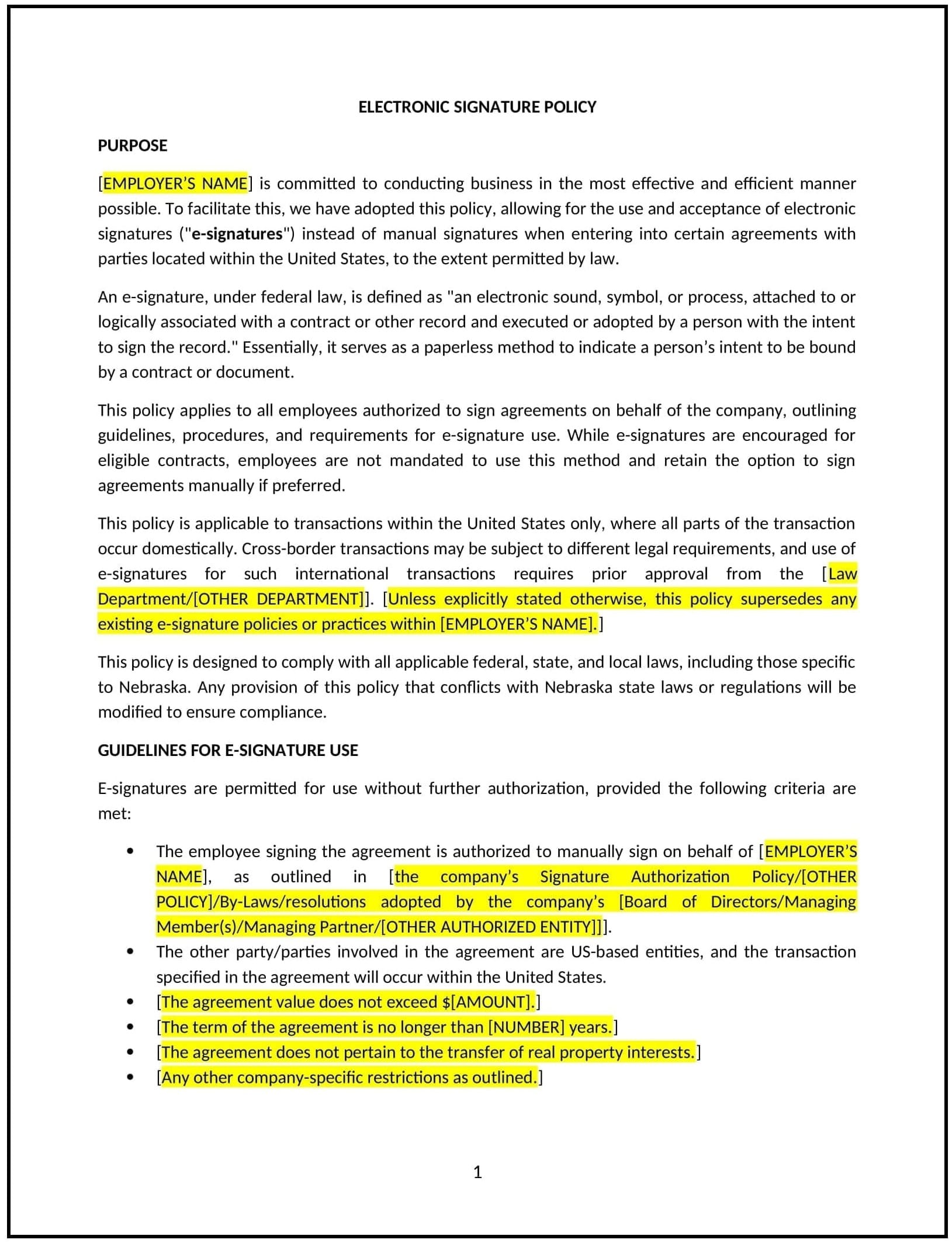Electronic signature policy (Nebraska): Free template
Got contracts to review? While you're here for policies, let Cobrief make contract review effortless—start your free review now.

Customize this template for free
Electronic signature policy (Nebraska)
An electronic signature policy helps Nebraska businesses establish guidelines for using electronic signatures in place of traditional handwritten signatures on documents and contracts. This policy outlines the acceptable methods for collecting electronic signatures, the types of documents that may be signed electronically, and the security measures needed to ensure the authenticity and integrity of electronic signatures. It is designed to streamline document signing processes while maintaining legal validity and protecting against fraud.
By adopting this policy, businesses in Nebraska can enhance operational efficiency, reduce reliance on paper documents, and ensure that electronic signatures are used appropriately and securely.
How to use this electronic signature policy (Nebraska)
- Define electronic signatures: Clearly define what constitutes an electronic signature under the policy, including typed names, scanned signatures, digital signatures, or other electronic methods of signing that are legally recognized.
- Specify acceptable methods: Outline the electronic signature platforms or methods that the business will use (e.g., DocuSign, Adobe Sign) and ensure they are secure and legally compliant. The policy should describe any verification processes used to confirm the identity of signers.
- Address which documents can be signed electronically: Specify the types of documents that may be signed electronically, such as contracts, agreements, HR documents, and financial records. Clarify any exceptions for documents that must still be signed by hand (e.g., notarized documents).
- Ensure security and authentication: Describe the security measures in place to protect electronic signatures, such as encryption, two-factor authentication, and secure storage of signed documents. The policy should outline how the integrity of the document is maintained during and after the signing process.
- Set record retention guidelines: Outline how electronically signed documents will be stored, retained, and archived to ensure they remain accessible and legally valid in case of disputes or audits.
- Define responsibilities: Specify who within the organization is responsible for managing electronic signatures, including employees involved in the document signing process and those overseeing the security and integrity of signed documents.
- Address legal validity: Ensure that employees understand that electronic signatures are legally binding under both federal and Nebraska state law, and outline any legal requirements that apply to electronic signatures in specific contexts (e.g., contracts, leases, employee agreements).
- Review and update: Periodically review and update the policy to ensure it aligns with changes in technology, business needs, and legal requirements in Nebraska.
Benefits of using this electronic signature policy (Nebraska)
This policy provides several benefits for Nebraska businesses:
- Increases efficiency: Electronic signatures streamline the signing process, eliminating the need for physical signatures, mailing documents, and handling paperwork, leading to faster turnaround times for agreements and contracts.
- Reduces costs: By reducing reliance on paper, postage, and in-person meetings, businesses can lower costs associated with document management and transaction processing.
- Enhances security: Electronic signatures can be more secure than handwritten ones, as they can be encrypted, tracked, and authenticated, helping to prevent fraud and ensuring the integrity of signed documents.
- Supports remote work: Electronic signatures enable businesses to collect signatures remotely, making it easier for employees, clients, and vendors to sign documents regardless of their location.
- Improves compliance: With proper recordkeeping and secure storage, businesses can better maintain legally compliant documents that are easily accessible when needed.
Tips for using this electronic signature policy (Nebraska)
- Communicate the policy clearly: Ensure all employees are aware of the electronic signature policy and understand when and how to use electronic signatures. This can be done through training, employee handbooks, and internal communications.
- Use trusted platforms: Choose electronic signature platforms that are secure, user-friendly, and legally recognized, and make sure all employees are trained on how to use them effectively.
- Ensure proper verification: Implement measures like two-factor authentication to confirm the identity of signers and avoid potential misuse of electronic signatures.
- Maintain secure records: Store electronically signed documents securely, ensuring they are easily retrievable while maintaining privacy and protecting sensitive information.
- Regularly update the policy: Review and update the policy periodically to ensure it remains effective and aligned with changes in technology, Nebraska law, and business needs.